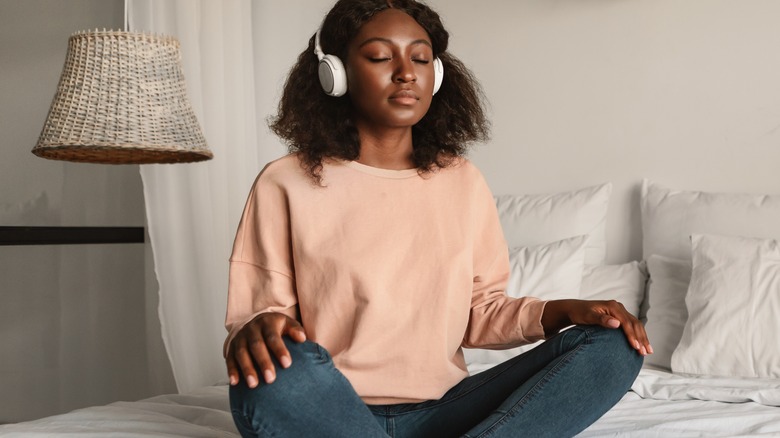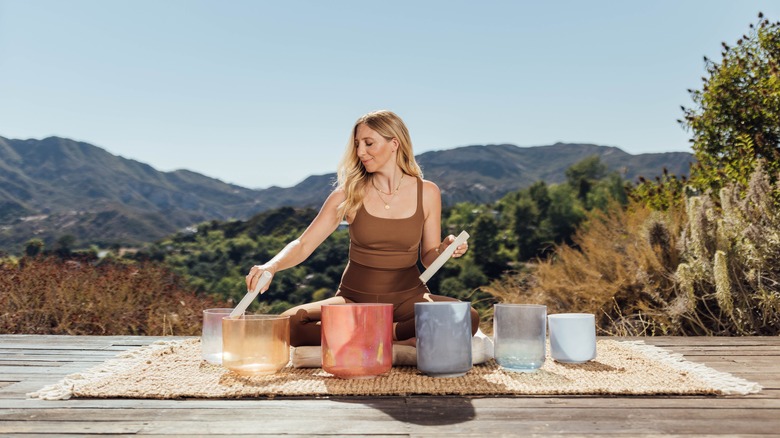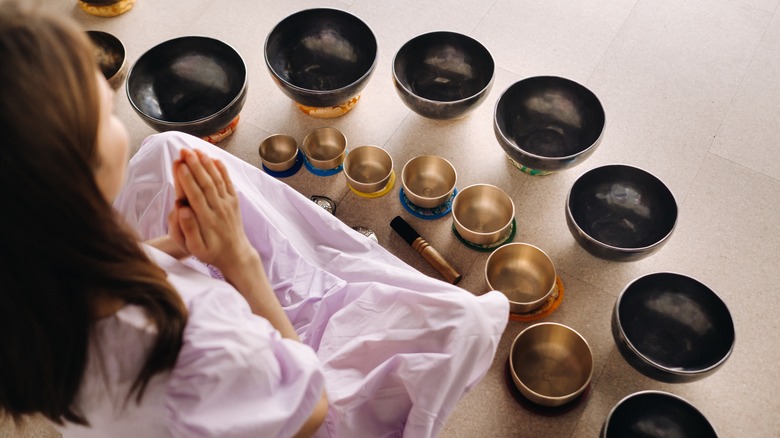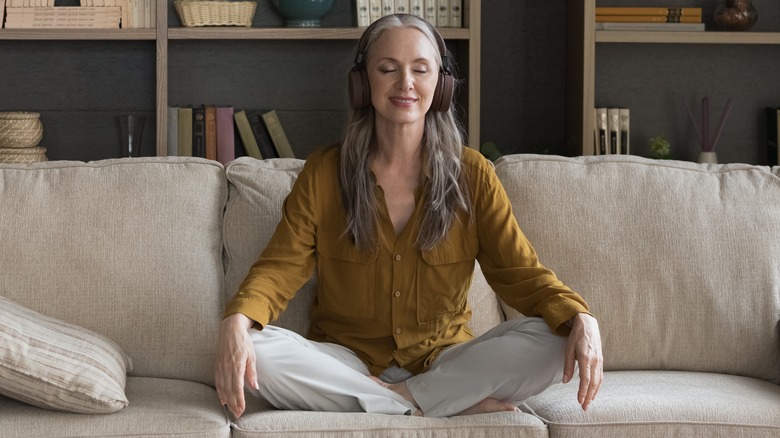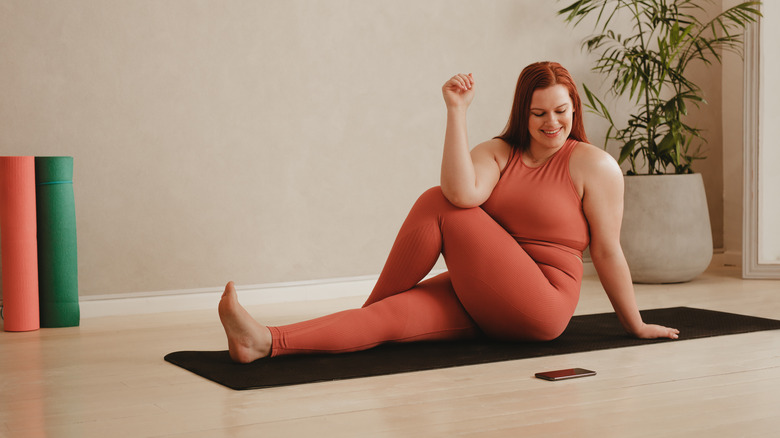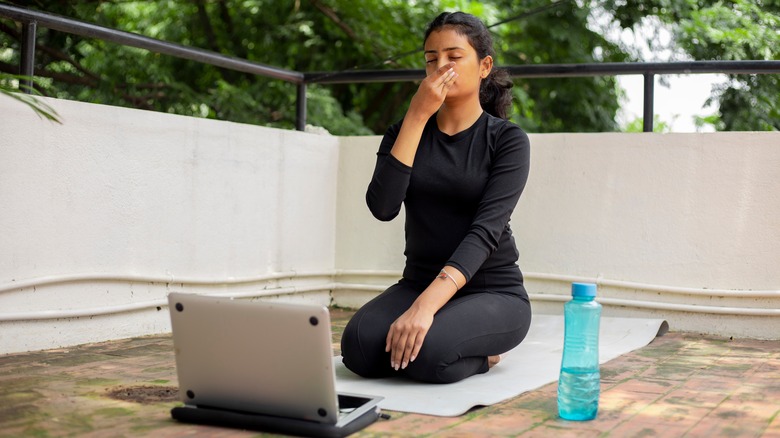Online Tools That Can Actually Help Your Mental Health
Americans are stressed. Since 2007, the American Psychological Association has tracked the mental health of the nation. The 2020 findings were sobering. The pandemic wreaked havoc on our collective well-being, adding to the existing stress caused by racism, economic instability, and political division. The APA warned that an impending national mental health crisis has the potential to cause severe social and health outcomes well into the future.
While you can't de-stress all the world's problems by yourself, you can learn to relax. Research from 2021 indicates that relaxation practices — like breathing exercises and meditation — can chill you out, lower your stress levels, and boost your mood overall. And, thanks to mobile apps and other online tools, never before have these modalities been so widely available. In 2018, one study concluded that the app revolution is poised to make mental health services more accessible to more people. Although the transformation is far from complete, the online tools available today offer a number of ways to relax with just a tap of a finger.
Here, we've compiled a list of practices with apps and tips to help you feel better. If one tool doesn't work for you, try another. There are a variety of anxiety apps and tools out there that could help manage your stress.
Reiki
Reiki is a century-old energy healing modality. Developed in Japan, the work reiki comes from two kanji, says reiki master teacher and sound healer Nicole Rutsch. In an exclusive interview with The List, Rutsch explains, "Rei means spiritual wisdom, and ki means life-force energy." While ki is similar to other energies like prana or chi, Rutsch states that ki is "guided by spiritual consciousness and is defined as spiritually guided life energy."
"As you release negative thoughts and stress from your body with the energy of reiki, you restore, balance, and accelerate your body's self-healing abilities, leaving you feeling energized and empowered," Rutsch tells us. Although research on the efficacy of reiki is still emerging, one 2019 study suggests that reiki can reduce anxiety: it continues to gain ground in mainstream medicine as part of integrative and complementary mental health.
Traditionally, reiki practitioners see clients in person so they can transfer the healing energy of reiki with a gentle touch. But, Rutsch says practitioners can also send reiki healing energy through time and space with intention, as she does on the Alo Moves app. Enjoy Rutsch's first-of-its-kind 7-day energy healing — a series of twice-daily meditations — or one of the many other mind-body offerings on Alo's subscription app (14-day free trial available).
Sound baths
Humans have used sound as a healing modality for millennia. In the same way a bath uses water to provide a physical sensation of relaxation, a sound bath uses vibrations and frequencies to soothe your central nervous system via your sense of hearing. Specific musical instruments like the didgeridoo, gongs, and singing bowls "help your body dive into a deep meditative state," explains Rutsch. The immersive experience of a sound bath has the capacity "to help release stress and anxiety, improve sleep, increase your metabolism (thus improving your body's energy levels), and aid reproductive health," she says. The small but growing body of research about sound baths indicates they can reduce tension, exhaustion, and anger while elevating mood. People for whom sound baths were a new experience saw the greatest reductions, but all participants reported increased feelings of spiritual well-being.
Get vibrating with sound therapist, meditation teacher, and author Sara Auster's free Instagram sound baths. For an extended experience, stream Sleeping Vibrations' overnight session for free on YouTube. The premium Sound Bath App, available on Android and iPhone, offers a variety of lengths and a 7-day free trial.
Meditation
Meditation is a mind-body practice where you focus your attention on the present moment. There are a number of techniques in various ancient traditions, but a few basics hold true. Most meditation for relieving anxiety is done in a quiet space while sitting comfortably. In this stillness, you can calm your mind and cultivate awareness of your thoughts.
Meditation can help you relax, lift your spirits, reduce feelings of chronic pain, and aid in better sleep. The National Institutes of Health cites a number of studies showing how meditation reduces the symptoms of depression and anxiety as effectively as evidence-based interventions like medication and cognitive behavioral therapy. Meditation also works for people in high-stress jobs like nurses. One study from 2022 found that meditation helped lower the nurses' levels of the stress hormone cortisol and their perceived levels of stress.
You don't have to practice meditation like a monk, alone on the top of a mountain. Subscription apps like Headspace and Calm can help frame your meditation in a number of ways and are effective in helping with mental health. One small study from 2019 looked at college students who used the Calm app. The results showed that, by helping users practice meditation, the app lessened their stress and helped make them more self-compassionate and mindful. For a spartan online meditation experience, use the highly customizable free Insight Timer to begin, end, and track your practice.
Yoga
If all this sitting has you feeling antsy, you might benefit from the kinesthetic qualities of yoga. Yoga combines a meditative state of mind with poses (called asanas) and controlled breathing (called pranayama). No matter the style or the difficulty, the goal of all yoga is the same: to help you de-stress. Johns Hopkins School of Medicine identifies a number of benefits from this ancient mind-body practice, including improved balance and flexibility, reduced back pain, and relief from chronic conditions like insomnia and arthritis. Evidence from the last two decades indicates that yoga helps us relax by de-exciting the body's adrenal axis and sympathetic nervous systems, helping reduce feelings of anxiety while lowering blood pressure and heart rate.
First time on the yoga mat? Here's a list of the yoga poses all beginners should know. Once you've familiarized yourself with the physical vocabulary of the poses and the Sanskrit/English names for them, hop onto YouTube. Pick one of the dozens of free videos from Yoga with Adriene. You don't require any fancy equipment or classes to develop a consistent at-home practice. Yoga International explains that all you need is four or five asanas that make your body feel so good, you'll want to get on the mat.
Deep Breathing
Inhale from your diaphragm, hold at the top, and exhale slower than you inhaled. Congratulations — you've just practiced deep breathing. This easy-to-use and under-appreciated mind-body technique can help improve your mental health. Also called pranayama or yogic breathing, recent research confirms that deep breathing can help you achieve a state of psychological relaxation. Unlike some other modalities, deep breathing actually excites the body at first, giving your insides a massage and oxygenating your blood. These beneficial physiological effects — notes a 2021 systematic review — can help reduce symptoms of asthma and even help people living with heart disease and cancer.
Follow along with Universal Breathing — Pranayama, an app for iPhone and Android with free and premium options. iPhone users can create their own breathing exercises at no cost in iBreathe. You could also breathe along with the Iceman, Wim Hof. The Wim Hof Breathing Method first induces hyperventilation, then asks participants to exhale and hold their breath for an extended period of time. Research suggests that this breathing practice, along with cold exposure and meditation, helps participants regulate their autonomous nervous systems. Once you learn how to breathe, relaxation is just a few exhales away.
